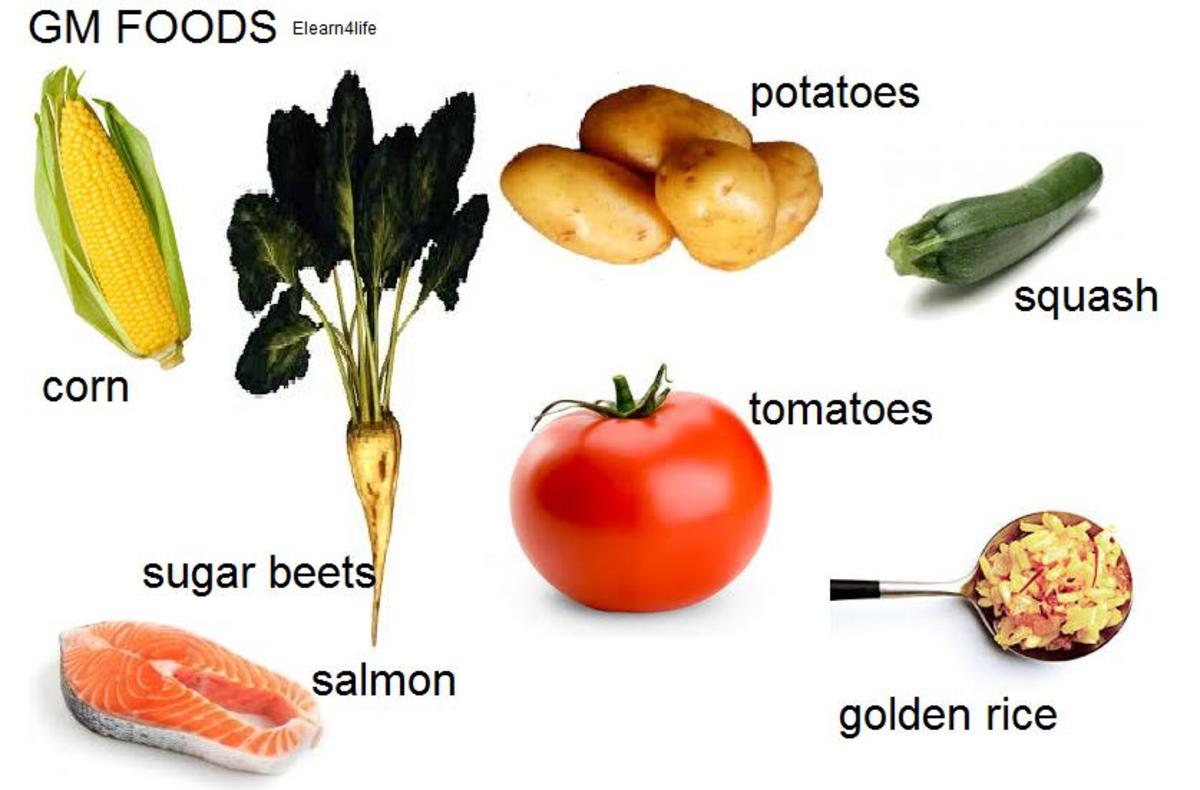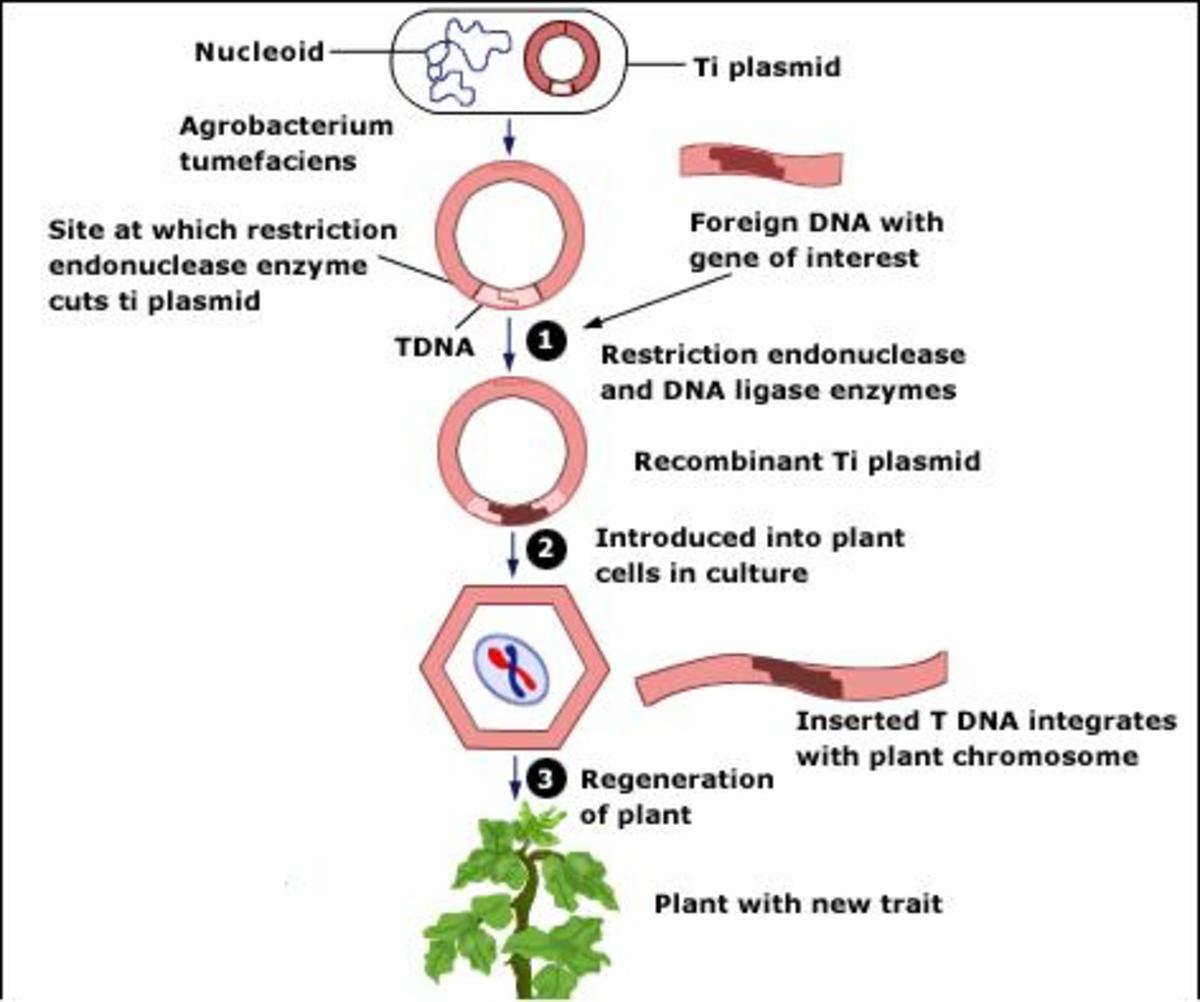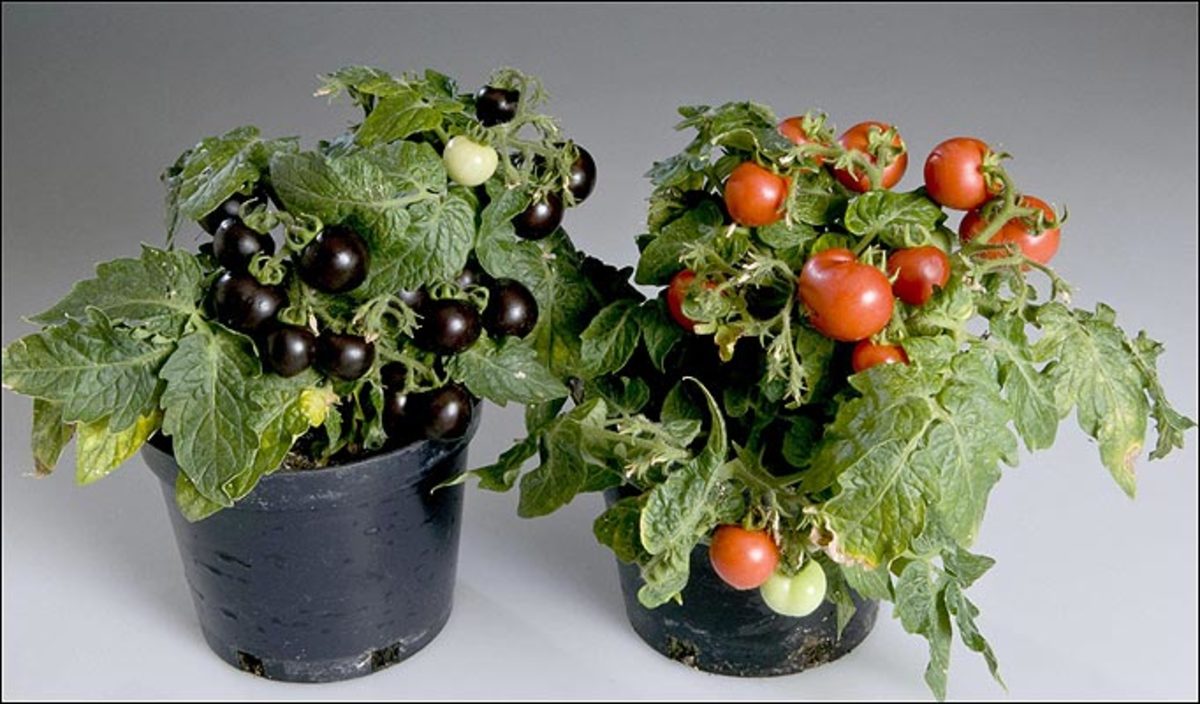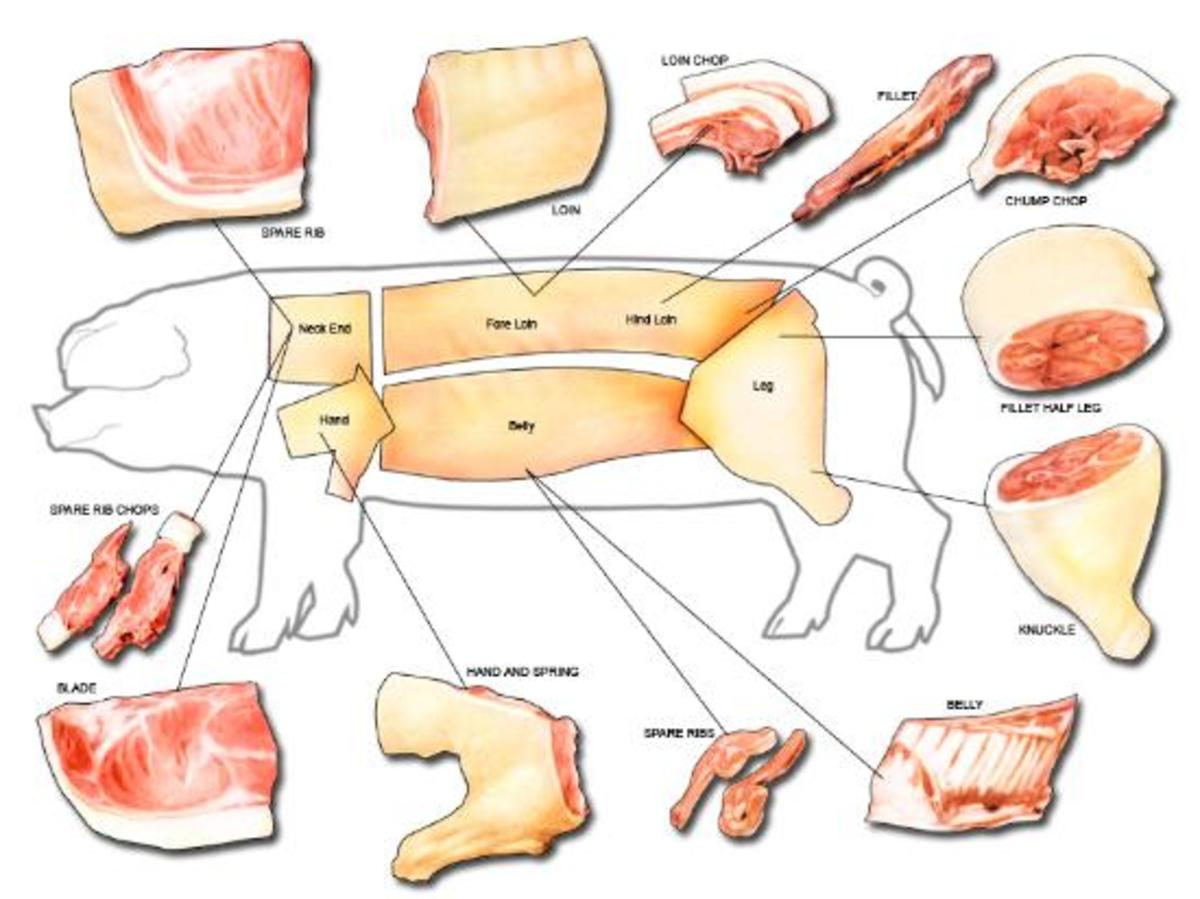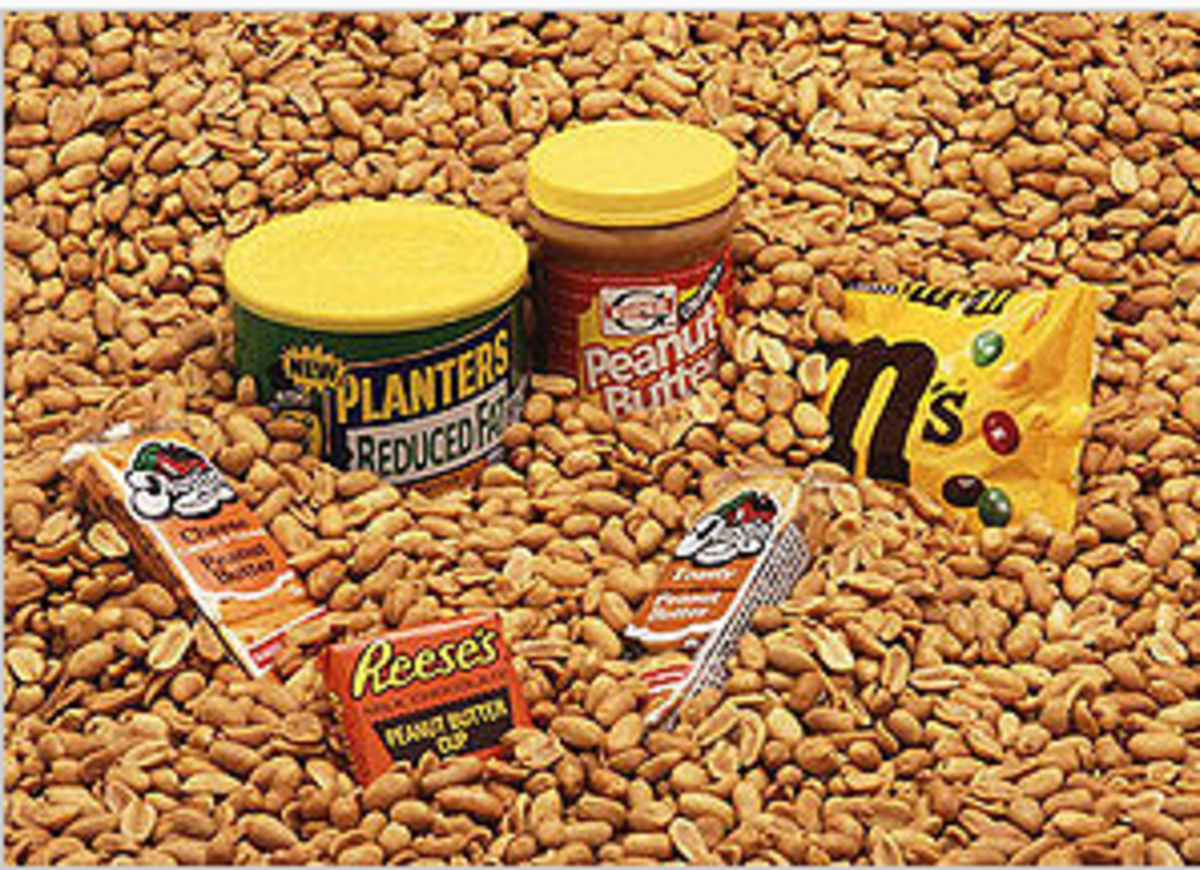Do You Want Your Foods Labeled as Gmo?
GMO vs. Non-GMO
Published on March 1, 2014.
I am going to tell you right up front that this article is written with the intention of trying to get you to support the labeling of GMO products to say they are "genetically engineered" or "genetically modified" foods. We see "GMO-free" so why not see "this food was made with GMO crops?"
It is my hope that after you read this article (and click the links for further reading) that you will answer the poll at the end of this article in the affirmative - that you want to know if your food has ingredients that were genetically modified. I thank you in advance for reading.
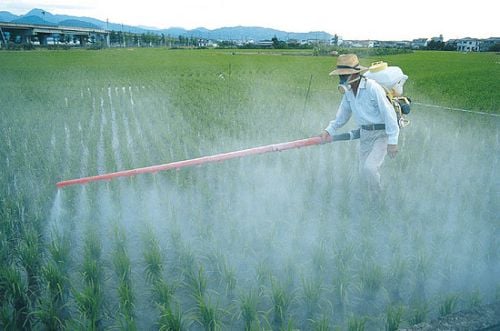
You won't get sick
The biotech companies who are responsible for the process of genetically modifying the seeds that ultimately become our food, and the herbicides they use to treat the crops while they are growing, would like us to believe that there are no ill effects from eating these foods.
They would like us to believe they are telling us the truth not only about the safety of GMO's and how the process works but what they did to the crop before it was planted and while it grows.
They would also like to see a lot of people go away, namely those who support putting GMO labels on their products. It would save them a lot of time and money in the long run.
But that is probably not going to happen.
With people being more conscious of the foods they are putting into their bodies, they are also becoming more conscious of how their food is made, what the ingredients are, and how some packaging might be deceiving because of the information that is left off the labels.
Omission is the same as lying.
Quoting The Stamford Times (link below)
"Connecticut's legislation stipulates that GMO labels would be required to appear on products in the state's supermarkets only after four other states bordering Connecticut enact similar rules.
It also requires that to enact such a law, there must be a total population of more than 20 million people.
In 2013, 95 bills related to the labeling of genetically modified food were introduced in 28 states, according to the National Conference of State Legislatures. Some have failed and others are still pending, but few go as far as Connecticut's law.
State Senate President Donald Williams Jr., D-Brooklyn, called on co-sponsors of the federal legislation to "lead the charge" for mandatory labeling in their respective home states.
"If a handful of States with a significant population, change and adopt the labeling legislation and requirement, then the companies will be forced to label on a national basis," he said.
Colorado Lawmakers Say GMO labeling Is An Option
If GMO labeling is an option, then buying it and eating it is also an option.
On January 30, 2014, lawmakers in the state of Colorado passed legislation that would give food producers "the option to voluntarily label their foods as genetically engineered or not."
Those who support GMO labeling can't catch a decent break. Even if the bill is worded to give growers the "option" and to not make GMO labeling a "requirement", the bill still fails at the state government level.
The bill was not a state law "requiring" food labels. It was a state law to give food producers the "option" to do it.
In my opinion, this is one of the most ridiculous ways to word a law.
Why do food producers need to have a state law giving them permission what to put on their labels? Since the FDA has them on the "honor system," it is a total waste of time and taxpayer dollars to even debate the subject. They can do as they wish because no one holds them accountable. When they are held accountable, it is way too late because the product has been in circulation for so long, that the list of ingredients as well as any of its health claims are now believed.
Wording the state bill to require GMO labeling, one way or the other, would have made legislators honestly earn their salaries. By juxtaposing the wording the way they did, they effectively stole their salaries, as well as robbed the American people of their right to know what is in their food.
On top of that, the Food and Drug Administration already has a system in place which, in part, says that producers can voluntarily choose to label their foods as genetically modified or not. That is called an "option!"
So why is this issue being put up on the ballots of so many states for voters to decide if they want GMO labeling?
Each state can introduce a bill either in their House of Representatives or their Senate with or without supportive input of voters. If the proposal for a bill is put on a ballot for vote, they are covering the voter's right to have a say on the ballot.
If the vote comes out in favor of introducing a bill into either House, you can be sure the big guns will come out to shoot it down in each House because so far, that's what has happened.
If the vote fails on a public ballot, legislators are off the hook as far as being pressured to introduce and vote on a bill in their House.
If the vote passes on a public ballot, all it does is move it to the front of the line when the bills come up for consideration in each House. The red tape machine inevitably will kick into motion so there will be delay after delay before coming up for discussion.
This process gets the voter's hopes up, allows the GMO producing companies to spend their money lobbying against the passing of labeling laws, and it pads the pockets of legislators who take payoffs to make sure that the laws do not make it to second or third base.
It is all a racket.
The Argument of Lawmakers
Lawmakers say that their reasons for not supporting any bills regarding GMO labeling are:
- States would be responsible for policing growers, producers and stores who lie saying their products are non-GMO. They would have to set up a penalty system which likely would include jail time.
- Companies will lose revenue if they label.
- Lawmakers say that foods labeled non-GMO will edge GMO producers out of the market (not a chance, given how many GMO farmers there are in the United States)
- They do not want to open their state governments up to expensive lawsuits if labels are misrepresented.
New Hampshire legislators and GMO labeling
After much rallying for support by pro-labeling groups, on January 22, 2014, legislators in the state of New Hampshire voted against the bill that was voter supported - House Bill 660. The result is that there will be no mandatory labels on genetically modified foods. There were 185 legislators who voted against the bill and 162 legislators who voted in favor of the bill.
Why vote at all?
It makes me wonder why we even bother to put these legislators in office. It also makes me wonder about how truthful our voting system is in reporting the final numbers. I'm not only talking about crooked, fixed or skewed elections.
I'm also talking about legislators who are in the pockets of the GM companies who were paid for their votes, to vote one way or another.
If our ballot votes don't count or if our votes are not going to be considered regarding a cause or concern, why even ask us what we think?
Every time we see a lot of hype about GMO labeling coming up for a ballot vote or a House vote, we seem to be disappointed when the bill or ballots fail us. The end result is always the same - that GMO labeling was not passed.
People will continue to believe their vote does not matter, and when asked if they voted, they will say, "Why should I bother?"
And that is when the big companies behind the production of genetically modified seeds, crops and food will have won.
Buying organic foods only will become a thing of the past because organic farmers will be edged out of the market and not able to compete to make a living.
The reason I say that is because not enough consumers will support the organic farmer in order for him to stay in business. GMO farms far outnumber organic farms who don't stand a chance.
I, for one, like being healthy and in order to stay that way, I have to have access to untainted, unadulterated, healthy food. The only way I can get that food is by truth in labeling.
It is a human right, one that is slowly being taken away from us.
Organic vs GMO
Given what you have read about genetically modified crops, if labels stated GM ingredients ... (choose one)
The organic farmer
If you voted in the above poll that you would still buy foods that are genetically modified, consider this.
- You will be supporting the GMO farmers more than the farmers who grow organic crops and our quest to be able to eat more healthily will fail.
- Buying organic will become a thing of the past because organic farmers will not be able to make a living because he won't have enough customers to buy his products.
Because all the fields surrounding his property are growing genetically engineered crops, it is inevitable that his land will be contaminated by:
- encroachment (land that meets land at the boundaries)
- runoff from water irrigation systems
- cross contamination by human error
- pollen from weather conditions
- when the wind blows residue onto their property
- This renders his crop contaminated and he can no longer say his is "organic."
He will lose his certification that states he is producing a 100% organic crop.
The consumer's ability to buy organic will become a thing of the past because the organic farmer won't be able to grow an unadulterated crop.
When GMO farms far outnumber organic farms, they don't stand a chance.
I, for one, like being fairly healthy and in order to stay that way, I have to have access to untainted, unadulterated, healthy food.
It is a human right, one that is being slowly taken away from us.
Former Pro- GMO Scientist Theirry Vrain
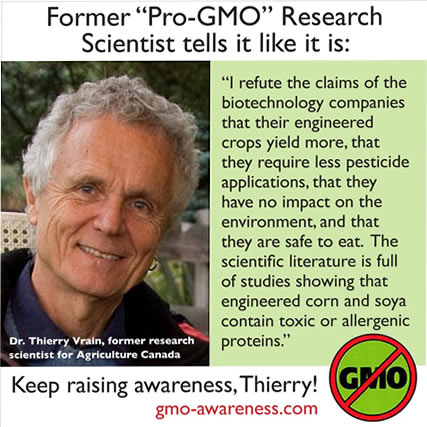
Believing GMO companies or believing past employees
Most of the information that we know about GM companies like Monsanto, DuPont Pioneer Hi-Bred, Dow AgroScience, Syngenta, Bayer CropScience and others who make genetically modified seeds for farmers grow crops and foods comes from word of mouth from scientists, past employees and regular folks like you and me who do their homework.
The federal government believes the big GMO companies when they say that "their studies" show there are no dangers to humans who eat genetically modified foods.
In 2013, President Obama said that he personally believes that GM foods are safe. By the time you read this, there will be another President in office who may not share the same views.
You have to consider the source of the President's information - he got it right from the GMO companies! He doesn't understand that the foxes are guarding the henhouse. He is also being told by the GMO companies that their product is safe. That is like believing the guard outside the door of the henhouse when he says that the hens who are inside will never be on someone's dinner table. GMO companies will say anything to get approvals they need to grow and market their products.
Look at the fortunes they are making all these years with these products. If they have to pay out fines for lawsuits in 20 years or more, they will have enough profits to be able to afford it.
Now, I don't make this next statement for you to write me nasty comments. I am just stating an opinion, one that may be shared by many readers.
I not naming a President. I am saying "any President." I believe that it will take a devastating illness in a U.S. President's immediate family, a disease where there is no family history of it, in order for that President to change his views on the safety of GM foods for humans.
- I offer you the following as an example to bring it into perspective: Admiral Elmo Zumwalt was in charge of the ground forces in Vietnam. He ordered 11,712,860 gallons of Agent Orange (also made by Monsanto) to be sprayed over the jungles of Vietnam from 1965 to 1970. When it wasn't working to his satisfaction, Monsanto said they had Agent Orange II which was much stronger and would produce far better results. He believed them and he ordered the use of Agent Orange II from 1971 to 1975. You can see pictures at this link.
- At the time, Admiral Zumwalt's son, Elmo Zumwalt 3rd, was an officer who was fighting on the ground during most of the years Agent Orange was sprayed. There were pictures and videos on the nightly news of Agent Orange being dropped to the ground, and people on both sides of the war were covered in powder.
- The Admiral's son died from the effects of Agent Orange, but he didn't die soon after he got out of the military. His death dragged out nearly 20 years until 1988 - here is his obituary.
- It took a devastating event like his son dying from the effects of Agent Orange for Admiral Zumwalt to see the error of his decision.
- Using what they learned about the effects of Agent Orange, they realized they had a product that could be modified for consumer use. So Monsanto turned their attention elsewhere using the chemical ingredients and repurposing them to create RoundUp, a herbicide meant primarily to treat weeds. In the 1980's, farmers said they were losing money because their crops were besieged by pests and fungus. So in addition to providing the dangerous glyphosate-based herbicide RoundUp, Monsanto developed seeds that were resistant to their herbicide so the crops wouldn't fail.
- Starting in 1987, Monsanto conducted field trials using their GMO seeds that were hardier and sturdier to see if they could hold up against harsh chemicals. The result was they created GMO crops. As the crops grew, they were treated with RoundUp. Monsanto took what they learned about the Agent Orange that devastated vegetation, insects and fungus, and put the ingredients into RoundUp for millions of homeowners to use in their yards - marketing it as safe.
- More than likely, you have seen the TV commercials where law firms are asking you to contact them if you got cancer from using RoundUp. Monsanto KNEW the effects of RoundUp for years - probably dating back to Agent Orange days - but they covered it up while they still sold it as a harmless chemical that was suitable for homeowners to use. UPDATE: 2019 - Monsanto lost their case in court and now must pay another $9 billion to settle millions of RoundUp lawsuits.
- You would think that lessons would have been learned after one go-around with Monsanto in Vietnam when so many people on both sides of the war were born with birth defects and died horrible deaths. But obviously, no lessons were learned, because Monsanto is now in charge of the country's food supply. GMO crops make up 95% of the crops being farmed in the USA and Monsanto is at the helm of the production of all GMO seeds.
- Monsanto also holds the patent on the manufacturing process for the seeds that grow into today's genetically engineered plants. What does that mean? It means no other company can make GMO seeds until their patent runs out. One wonders exactly what was done to those seeds to make them resistant to this harsh chemical?
Just as it took from the 1960's to 1988 for Admiral Elmo Zumwalt's son to die from the effects of Agent Orange, we are now seeing homeowners who have used RoundUp for 20 plus years who are dying from cancers related to RoundUp usage.
This is why I say that the bad news about eating foods made from GMO crops is that it may take 5, 10, or even 20 years for any such disease to manifest itself. By then, tracing it back to GMO crops will be nearly impossible. Unless we remember the lessons that were learned about Monsanto in the past.
Long range effects of GM foods
Processed foods
90% of all processed foods have at least one ingredient made, or derived from genetically modified crops, according to the nonprofit Center for Science in the Public Interest and the Grocery Manufacturers Association.
GMO Apples
It appears imminent that the US Dept. of Agriculture will approve a genetically modified apple which is not supposed to brown after slicing.
Their choice of an "apple" is interesting to me because I can think of one other instance (in the Bible) where an apple was the center of attention and it did not bode well for those who ate it.
UPDATE: This article was written in 2014 before it became fact that apples were in the running for GMO status. As of 2015, all apples produced in the USA are genetically modified.
From a little herbicide to a lot of herbicide
I think of it this way. If a drug addict starts with a small dosage of drugs, it isn't long before he builds up a tolerance to that dosage. He needs a higher dosage to accomplish the same effect. As each dose is no longer effective, seeking a higher dosage becomes a never-ending cycle.
Now take that analogy and apply it to herbicides that are used on crops.
Over time, using the same amount of herbicides and pesticides makes crops build up a tolerance. They become resistant. Soon much bigger, badder and stronger herbicides and pesticides must be used.
The biggest, baddest herbicide in our history was Agent Orange, used in the Vietnam War, jointly supplied by Dow Chemical and Monsanto Corporation.
Monsanto was the sole supplier of the "rainbow" herbicides which include from Agent White, Pink, Blue, Green, Purple, and Orange - all of which vary in degrees of strengths and target specific areas. Dow had one ingredient which was needed to cultivate Monsanto's product. That's the only reason Dow was involved.
The chemical companies have access to stronger herbicide agents. Some consumers feel the companies are saving them for a day in the not too distant future when more potent formulas will be needed to kill the weeds, pests and fungus that attack their crops.
No matter how many studies and reports I see, no one can tell me that all of these chemicals won't have long term effects on humans. The pictures of their laboratory rats are scary enough, but when we read letters like the one above from Thierry Vrain, we should be afraid. We should be very afraid.
To date, the US federal government has not approved any genetically modified animals as food. But what gets me is that most livestock in the US are already being fed genetically modified feed, so whether consumers realize it or not, they are getting GM food from these animals.
To take that a step further, consumers are not "updated" whenever a food source is starting to use genetically modified seeds. Foods that consumers originally thought were untainted by the genetically engineered process will be eaten unknowingly.
In all honesty, one has to consider whether the fight to have their foods labeled with GMO information is really worth it, given the past record of several states in the US who have tried to pass GMO labeling on a state level, no matter that the FDA already gives the option to growers. If a grower who does not use GMO seeds wants to label his food "GMO-Free" - the FDA's stand is that it is up to the grower. IF he doesn't want to label his product that it uses GM crops, the FDA's stand is that it is up to the grower. In other words, the FDA has taken its normal stand which is to stick their head in the sand and say "do what you want to do." This is because the FDA doesn't regulate or govern. They use the "honor system" for manufacturers to tell the truth.
Monsanto can't tell the truth. It costs them too much money. They would rather wait until they get caught, because past history shows it can take upwards of 20 years for their secrets to be discovered. By then, they can make a heck of a profit and afford to pay out the fines and lawsuits.
Natural GMO's?
The Food and Drug Administration (FDA) states that all genetically engineered foods must meet the same requirements as regular foods.
As stated above, the FDA does allow voluntary labeling by food producers to say if their food is genetically engineered or not.
Voluntary means it is an option which you can see from the food on your grocery shelves, many choose not to exercise the labeling option.
In December 2013, the Grocery Manufacturers Association wrote a letter to the FDA asking if their foods which were "derived from bio-technology" could now be allowed to be labeled "natural."
The meaning of "natural" seems to have become skewed.
Did you know?
Most people read ingredient labels. We assume the information is truthful, but, in actuality, it can go either way because the FDA has all manufacturers on the "honor system." There are no FDA impromptu visits, no periodic checks and no accountability before products go on store shelves.
Therefore, the manufacturers can leave out or include anything they want on the ingredient labels. Until they get caught.
Earning high profits makes the risk worth it to lie a little (or omit).
Turning to GMO products, there are a lot of crops that are GMO now: Corn (Maize), Soybeans, Cotton, Potatoes, Papaya, Squash, Alfalfa, Sugar Beets, Apples, Canola.
If you want to eat GMO free and if you are not aware of what crops are GMO, then when you buy your weekly food at the supermarket, you will be buying blind because you are totally unaware of what foods are GMO.
Take each one of those crops and see if you can guess how many products are made from them. The list is astronomical. Foods that you would assume are not GMO, are GMO, because of the crop they came from.
The Canola that we use for cooking is also used in animal feed - so the meat and by-products of that animal are now GMO because of the food that it was fed.
Cotton is another crop you would assume wouldn't matter if it was GMO or not because most people don't eat anything that comes from Cotton. But they do, because Cotton is used as animal feed (and we eat animals), Cottonseed Oil (used in cooking), and Cotton is used as a source of Fiber in food and medicines to add bulk.
Soybeans is another crop that comes into question. Because many people have cut Soy out of their diet, they assume they are not getting any soy in their foods. But they are. Soy is also used as livestock feed, in pet and animal feed, as a vegetable oil, in tofu, soy sauce, canned pet food, and it is added to vitamin supplements in the form of Lecithin.
To make informed decisions on whether to buy a product, consumers need to know if any of the ingredients in their foods were genetically engineered. But most companies won't use GMO labeling because they will lose profits.
I say it is too bad if GMO companies stand to lose revenue. I stand to lose my life if I ignore present day science and make a food choice that may potentially harm me over the long range of my life.
If years from now, GMO food is ever proven to be totally harmless, I still deserve the right to make an informed choice today, whether I want to eat it or not.
And so do you.
Better safe than sorry, just label it.
Truth In Labeling Will Have A Domino Effect
We will never know if "organically grown" is truly safe from contamination, unless we are growing it ourselves in our own backyard under very controlled conditions.
This is why we hear about so many Americans who are trying to live off the grid - they are growing their own food, using alternative power sources for energy, and participating in organic co-ops and other programs. They do not want to be held hostage by these companies. They also want to be sure of what is in their food.
Here is a little bit about a blogger who got an education when she visited a neighboring farm. The Illinois Farm Family blog documents Renee Keats and a small group of the Illinois Moms who took a tour of a local farm - Jeschke Farms. Renee wrote: "various family farms have “test plots” used solely for seed companies to test and research the effectiveness of newly developed seeds. Thus these farmers have a vested interest in the successful outcomes gained from agricultural research."
We have been told repeatedly that GMO's crops only affect our grains so far, but that can't possibly be true. Apples, papaya, squash, cotton, and canola are not grains. They may be used in the processing of grains, but they are 100% GMO crops.
Take it a step further. Those grains are fed to our livestock (which we eat), therefore we are still eating GMO products. I suspect that requiring labeling will reveal even the most trusted companies (Purdue, Tyson, Angus, etc.) are involved in genetic engineering. They just don't want us to know it.
Labeling causes more problems for GM food producers and the companies who supply their seed and they will go to any length to deter labeling.
The longer these companies can keep the words "GMO" off the labels, the longer they have to get their affairs in order to bury or falsify findings in order not to lose the consumer's trust but most importantly, any government funding that comes their way.
Mary McShane, March 1, 2014
Regarding the labels on food,
This content is accurate and true to the best of the author’s knowledge and is not meant to substitute for formal and individualized advice from a qualified professional.
© 2014 Mary McShane

